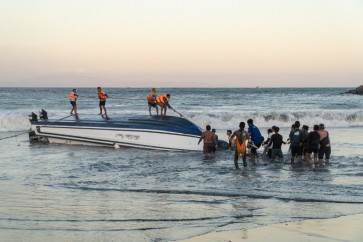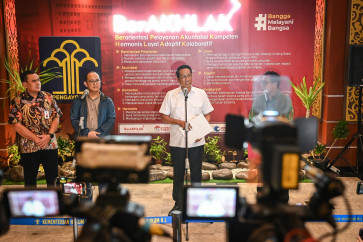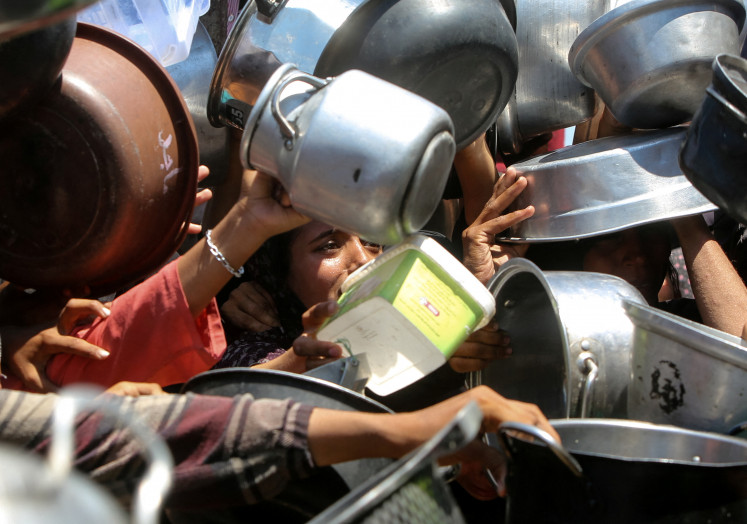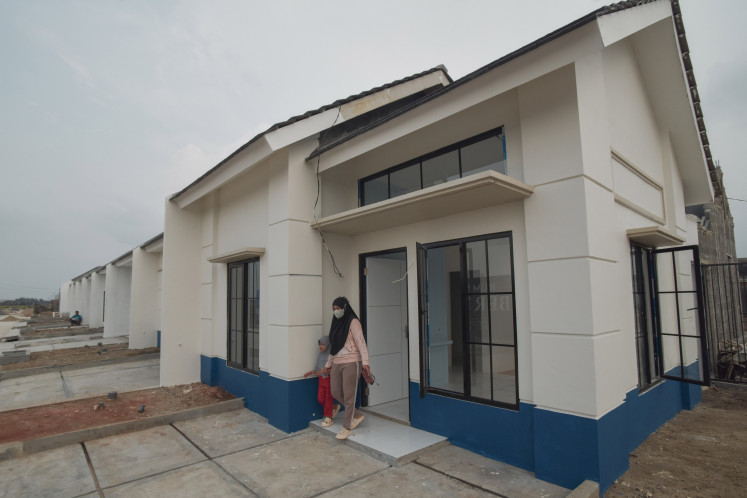Popular Reads
Top Results
Can't find what you're looking for?
View all search resultsPopular Reads
Top Results
Can't find what you're looking for?
View all search resultsInternational trade data discrepancies
Shortly after visiting China last week, President Susilo Bambang Yudhoyono displayed deep concerns over discrepancies between Indonesian and Chinese trade data
Change text size
Gift Premium Articles
to Anyone
S
hortly after visiting China last week, President Susilo Bambang Yudhoyono displayed deep concerns over discrepancies between Indonesian and Chinese trade data. As has been reported, a significant discrepancy was found in bilateral trading data between the two countries as a possible result of smuggling and transshipment.
This is a critical moment for the two countries to overcome the problem, since their leaders are paying attention to an issue that has long been neglected. Such awareness is very important since this problem is actually a multi-sector problem, which requires comprehensive coordination both at the national and international level.
In my view, the optimal way to find the source of these discrepancies is through establishment of electronic data exchange between China and Indonesia. By doing so, a record matching is possible and illegal trade activities can be traced to uncover the identity of the perpetrators as well as their modus operandi.
Such an initiative is actually covered by Article 2 (point f and h) of the Framework Agreement on Comprehensive Economic Cooperation between ASEAN and the People’s Republic of China, signed in 2002.
In this case, it is important to note that foreign business players may contribute to trade data discrepancies. Therefore, the electronic data exchange should be expanded and include other ASEAN countries, including Singapore, which is often involved with illegal transshipment practices.
This measure will also help to evaluate the “real” performance of the ASEAN Free Trade Area (AFTA) in addition to the ASEAN-China Free Trade Area (ACFTA) and to ensure fair international trade practices based on mutual respect and trust.
While IT advancements have made this initiative technically feasible, implementation will require strong political commitment from all countries. This has become the hardest barrier to clear, as some countries may take advantage of being less transparent about their international trade data.
So far, a similar measure is in place through the manual certificate of origin verification process. But in fact, many export activities from Indonesia to China and ASEAN do not come with certificates of origin. Based on reports from the field, only major companies are really “aware” of the benefits or use of certificates of origin. Poor administration of the certificates is also a critical issue for the Trade Ministry to tackle. That’s why this measure is not effective in detecting trade violations.
The customs agency has been collaborating with both the Bank Indonesia (BI) and the Central Statistics Agency (BPS) through a forum among the three institutions called B3 for years to support and speed up flows of international trade data.
Since 2003 the customs agency has provided electronic data on all imports and exports to BI and BPS, reducing the manual workload and information delays significantly.
With recent IT developments in the customs office, electronic support is better than ever. Still, BPS remains a key part of the process, and a regular meeting is held to discuss any data discrepancies between electronic data and manual ones.
Nevertheless, additional projects are still needed, particularly to provide more reliable export and import data from bonded zones.
Furthermore, the B3 forum should also welcome more agencies, particularly the Trade Ministry, Industry Ministry and the Fiscal Policy Office to optimize the use of data to analyze our international trade performance.
Based on my past experience as electronic data support staff at the customs office headquarters, colleting electronic data is not an easy task. Over 100 regional customs offices are scattered from Sabang to Merauke, with each having staff as well as clients with different levels of computer proficiency and facilities.
In many remote offices, such work often received less attention and was even considered unimportant. However, since reform began, such work has been made obligatory. An Internet network was built to collect such data electronically. The system is planned to be centralized to ensure equal service and data uniformity.
While the reliability of import data is quite high, as all customs office have to check the import tax and customs duties, this is not the case for export data, except for commodities that have export duties, such as palm oil, or exports with tax refund facilities. This is because many local exporters are reluctant to provide electronic documents since most of them are still using a traditional administration system. Local customs officials also tend to ignore export control activities.
The use of advanced technologies, including IT systems, X-ray systems, radar and regular patrol boats will never be enough to stem the international flow of illegal goods without collaboration from trustworthy counterparts, including business players and overseas customs agencies.
The writer is former head of electronic data services section at the Indonesian Customs Headquarters and currently a PhD candidate at CTH Gothenburg.










